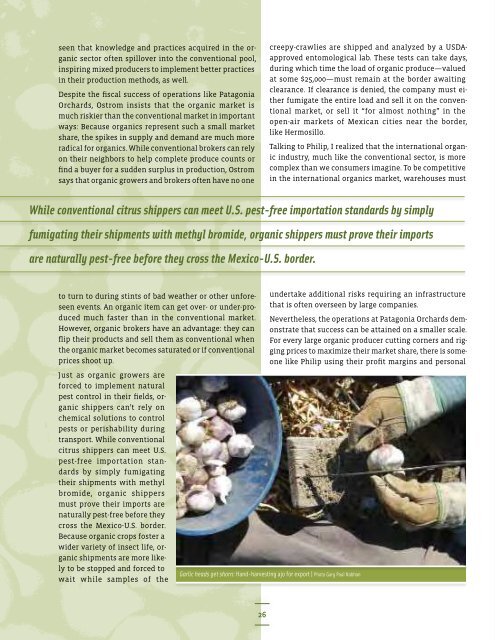Hungry for Change: Borderlands Food & Water in - Southwest ...
Hungry for Change: Borderlands Food & Water in - Southwest ...
Hungry for Change: Borderlands Food & Water in - Southwest ...
Create successful ePaper yourself
Turn your PDF publications into a flip-book with our unique Google optimized e-Paper software.
seen that knowledge and practices acquired <strong>in</strong> the organic<br />
sector often spillover <strong>in</strong>to the conventional pool,<br />
<strong>in</strong>spir<strong>in</strong>g mixed producers to implement better practices<br />
<strong>in</strong> their production methods, as well.<br />
Despite the fiscal success of operations like Patagonia<br />
Orchards, Ostrom <strong>in</strong>sists that the organic market is<br />
much riskier than the conventional market <strong>in</strong> important<br />
ways: Because organics represent such a small market<br />
share, the spikes <strong>in</strong> supply and demand are much more<br />
radical <strong>for</strong> organics. While conventional brokers can rely<br />
on their neighbors to help complete produce counts or<br />
f<strong>in</strong>d a buyer <strong>for</strong> a sudden surplus <strong>in</strong> production, Ostrom<br />
says that organic growers and brokers often have no one<br />
to turn to dur<strong>in</strong>g st<strong>in</strong>ts of bad weather or other un<strong>for</strong>eseen<br />
events. An organic item can get over- or under-produced<br />
much faster than <strong>in</strong> the conventional market.<br />
However, organic brokers have an advantage: they can<br />
flip their products and sell them as conventional when<br />
the organic market becomes saturated or if conventional<br />
prices shoot up.<br />
Just as organic growers are<br />
<strong>for</strong>ced to implement natural<br />
pest control <strong>in</strong> their fields, organic<br />
shippers can’t rely on<br />
chemical solutions to control<br />
pests or perishability dur<strong>in</strong>g<br />
transport. While conventional<br />
citrus shippers can meet U.S.<br />
pest-free importation standards<br />
by simply fumigat<strong>in</strong>g<br />
their shipments with methyl<br />
bromide, organic shippers<br />
must prove their imports are<br />
naturally pest-free be<strong>for</strong>e they<br />
cross the Mexico-U.S. border.<br />
Because organic crops foster a<br />
wider variety of <strong>in</strong>sect life, organic<br />
shipments are more likely<br />
to be stopped and <strong>for</strong>ced to<br />
wait while samples of the<br />
creepy-crawlies are shipped and analyzed by a USDAapproved<br />
entomological lab. These tests can take days,<br />
dur<strong>in</strong>g which time the load of organic produce—valued<br />
at some $25,000—must rema<strong>in</strong> at the border await<strong>in</strong>g<br />
clearance. If clearance is denied, the company must either<br />
fumigate the entire load and sell it on the conventional<br />
market, or sell it “<strong>for</strong> almost noth<strong>in</strong>g” <strong>in</strong> the<br />
open-air markets of Mexican cities near the border,<br />
like Hermosillo.<br />
Talk<strong>in</strong>g to Philip, I realized that the <strong>in</strong>ternational organic<br />
<strong>in</strong>dustry, much like the conventional sector, is more<br />
complex than we consumers imag<strong>in</strong>e. To be competitive<br />
<strong>in</strong> the <strong>in</strong>ternational organics market, warehouses must<br />
While conventional citrus shippers can meet U.S. pest-free importation standards by simply<br />
fumigat<strong>in</strong>g their shipments with methyl bromide, organic shippers must prove their imports<br />
are naturally pest-free be<strong>for</strong>e they cross the Mexico-U.S. border.<br />
undertake additional risks requir<strong>in</strong>g an <strong>in</strong>frastructure<br />
that is often overseen by large companies.<br />
Nevertheless, the operations at Patagonia Orchards demonstrate<br />
that success can be atta<strong>in</strong>ed on a smaller scale.<br />
For every large organic producer cutt<strong>in</strong>g corners and rigg<strong>in</strong>g<br />
prices to maximize their market share, there is someone<br />
like Philip us<strong>in</strong>g their profit marg<strong>in</strong>s and personal<br />
Garlic heads get shorn: Hand-harvest<strong>in</strong>g ajo <strong>for</strong> export | Photo Gary Paul Nabhan<br />
They don’t call them Cuties down here: Citrus headed north | Photo Laurel Bellante<br />
time to ensure growers receive a fair price, assist <strong>in</strong> crop<br />
plann<strong>in</strong>g and, where possible, offer their services to<br />
f<strong>in</strong>ance small growers on both sides of the border or<br />
facilitate the <strong>in</strong>stallation of new wells, solar panels or<br />
drip irrigation.<br />
Philip understands what labels can conceal: “We do a lot<br />
to try to not hide beh<strong>in</strong>d the label. We aim to build transparent<br />
relationships between the consumer and the<br />
grower.” Ironically, it is often the retailers themselves<br />
that <strong>in</strong>hibit consumers’ abilities to discern between<br />
products. Although one of the goals of Patagonia<br />
Orchards is to promote crops that are Arizona grown,<br />
most retailers consider it “too much work” to advertise<br />
which products are local. Big box retailers like Target or<br />
Wal-Mart further confuse the marketplace by stamp<strong>in</strong>g<br />
the same organic label on all of their produce—“whether<br />
it’s a carrot grown <strong>in</strong> Fullerton or a lime from Veracruz.”<br />
So just as the label is tell<strong>in</strong>g you someth<strong>in</strong>g (organic!), <strong>in</strong><br />
the end it might tell you very little.<br />
In this age of global trade, food will always be polemical.<br />
Every new label is met with new attempts to capture the<br />
market and corrupt the standards created <strong>in</strong> its wake,<br />
play<strong>in</strong>g on consumer imag<strong>in</strong>aries and gloss<strong>in</strong>g over ambiguities.<br />
Even as new <strong>in</strong><strong>for</strong>mation is released to raise<br />
consumer skepticism about the organic <strong>in</strong>dustry’s environmental<br />
susta<strong>in</strong>ability and social justice practices,<br />
there are also players like Philip Ostrom who strive <strong>for</strong><br />
26 27<br />
more accountability and better practices <strong>in</strong> the organic<br />
sector. Far from be<strong>in</strong>g a panacea, the global organic sector<br />
cont<strong>in</strong>ues to rely on significant <strong>in</strong>frastructure and<br />
natural resources that should <strong>in</strong>vite reflection each time<br />
we sip down our morn<strong>in</strong>g coffee or bite <strong>in</strong>to an organic<br />
banana imported from Ecuador. It is also reason to get<br />
acqua<strong>in</strong>ted with the differences <strong>in</strong> scale and practice<br />
between organic labels. I, <strong>for</strong> one, now search <strong>for</strong> that<br />
colorful little Patagonia Orchards label and take com<strong>for</strong>t<br />
that it decorates someth<strong>in</strong>g worth tak<strong>in</strong>g home to eat.


